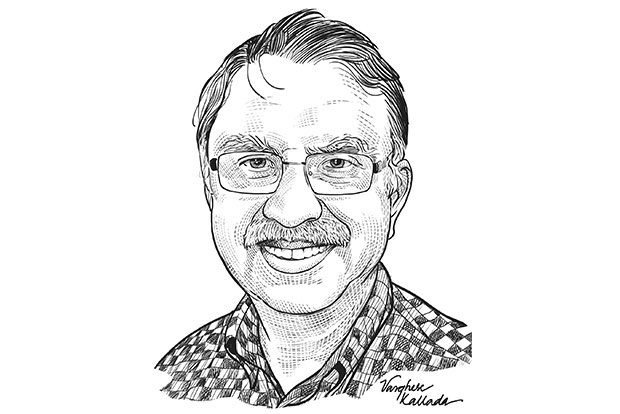Begin typing your search...
‘Medical profession needs human touch’
Kidney disease is painful, prolonged, expensive. Dr Georgi Abraham, founder of the Tamil Nadu Kidney Research Foundation, has in him a fiery idealism; he wants to make patients aware of the problem before it reaches an unmanageable stage through nationwide screening and has been urging doctors to go into the community with this message.

Chennai
Dr Georgi Abraham dons many hats — nephrologist, lecturer and researcher – doing justice to his many roles with aplomb. For the affable and passionate doctor, who is the founder trustee of the Tamil Nadu Kidney Research (TANKER) Foundation and Kerala Kidney Research Foundation, professor of medicine, Pondicherry Institute of Medical Science, and director, Nephrology, Madras Medical Mission, all the roles are linked to the one passion – nephrology — and the determination to serve.
During a recent interaction, he shared with the DT Next team his incredible journey in the field of medicine. He explained, “During my stint in Toronto Western Hospital, my late boss Dr Dimitrios G Oreopoulos used to often say that not a single patient should be denied treatment. His family had borne the brunt of World War II and his philosophy was never to allow people to undergo difficulties. I wanted to adopt his humanitarian approach through the TANKER Foundation. All those involved with the foundation have had a relative who was afflicted by kidney disease.”
Following in Dr Oreopoulos’s footsteps, a few years after he returned to India, he laid the basis for the TANKER Foundation in 1993, which has, ever since been offering dialysis services at subsidised rates, creating awareness about kidney disease and promoting research activities, apart from encouraging organ donation. Over the last 23 years, the TANKER Foundation’s dedicated team has been serving a wide community of patients inside India and abroad.
“We had installed a dialysis unit at a Catholic mission hospital in Koirengei near Imphal when we saw that the insurgency-hit state had extremely limited access to healthcare and the special taxes imposed there raised the cost of services further. Similarly, in Tanzania we involved the Indian government to establish a dialysis unit at Muhimbili National Hospital in Dar es Salaam after I saw two young women on the ventilator due to kidney failure soon after childbirth,” he added.
One of the major milestones for the foundation has been the establishment of a dialysis unit for the HIV positive at a time when they were being denied treatment. “Dr Oreopoulos had generously donated $5,000 for the facility when I met him at a world congress in 2008 and told him about my plans,” Dr Abraham added.
As an advisory committee member of the International Society of Nephrology for Access to Dialysis in Developing Countries, editor in chief of the Indian Journal of Peritoneal Dialysis and part of the editorial board of Nephrology Dialysis Transplantation, Peritoneal Dialysis International and Hemodialysis International, NephSAP, Dr Abraham has also been wielding the pen to create awareness on kidney disease through his research papers. “Awareness levels about kidney diseases is low even among Americans, and even poorer in our country. Recently, I co-authored an article which was published in The Lancet about the prevalence of kidney disease in 12 countries. Managing kidney diseases would be effective if people followed the doctor’s instructions. But most often, they want the specialist to handle it all without any will from their side.”
He added that even doctors had to be equipped to identify kidney diseases. “There is very little taught about the kidney in the MBBS curriculum. In the absence of knowledge, doctors may mismanage the condition,” Dr Abraham pointed out.
While the foundation was working extensively on creating awareness, he admitted that awareness programmes had only limited reach. “Studies show that there is a high prevalence of kidney disease in developing countries, which is related to the hot climate. Nationwide screening is required, and if its progression is reversed, there is no need for dialysis or a transplant. Simple creatinine and urine tests can establish the presence of kidney problems. While we are creating awareness through our activities, we are reaching only a few people. We need people to go into the community and spread the word,” he pointed out, adding that at the Ambattur Rotary Hospital they have a screening clinic every week. “Treatment puts an enormous burden on the patients. Early diagnosis is important,” Dr Abraham said.
Commenting the robust organ donation and transplant ecosystem in the state, Dr Abraham said, “We need a separate group in place for counselling the family. As part of our activities, we had forums discussing the care of donors, recipients and preventing commercialisation of the organ donation exercise. We sent our observations to the UN and they endorsed it,” he recalled.
Potential donors are the brain dead, but there is another group too. “They are also known as poisoned donors, those who have died due to snake bite or after consuming poison, but it hasn’t affected their kidney or liver. There are an estimated 50,000 snakebite envenomation deaths every year in India,” he said.
Visit news.dtnext.in to explore our interactive epaper!
Download the DT Next app for more exciting features!
Click here for iOS
Click here for Android
Next Story



